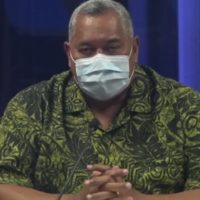
A new memo from Governor Lemanu Peleti Mauga issued today should help lessen the confusion about departments and businesses should be opened or closed and which employees are deemed essential and non essential.
Essential employees are:
[E]ssential employees who directly perform or support essential services such as those related to public safety; health; utilities; food production, distribution, and sales; sanitation and laundry; telecommunications; media; essential construction; essential retail, port operations; essential payroll and fiscal services; and similarly, essential services.
Essential businesses are those that address health, safety, and welfare of residents of the Territory and that are so important that they need to continue in spite of the risk involved.
According to the memo the following are identified as essential businesses:
1. Essential Government functions including public safety, first responders, law enforcement, fire prevention and response, military, emergency management personnel, corrections, probation and parole, child protection, child welfare, EMTs, 911 call center employees, vendors that support law enforcement and emergency management operations and services;
2. Essential healthcare operations including hospitals/clinics, laboratory operations, nursing homes, residential health care facilities, assisted living facilities, elder care, medicalM, wholesale and distribution, home health workers and aides, medical supply and equipment providers, medical waste disposal, hazardous waste disposal, other ancillary healthcare services;
3. Essential infrastructure including utilities, power generation, utility poles and components, fuel and transmission, petroleum suppliers and distributors, supply chain companies, telecommunications, electronic security and life safety services, wireless communication, communications sales and customer support, telecommunication and data centers, cybersecurity operations, flood control, operation of water supply, aviation, airports, ports, roads and highways, automotive repair, vehicle rental services, taxi and network providers freight and transportation infrastructure, public water and waste water, hazardous waste disposal, hotels and commercial lodging services;
4. Agriculture and farms, including food cultivation, livestock, poultry and seafood operations, farmer’s markets, gas, diesel and petroleum suppliers, aquaculture, horticulture, veterinary services;
5. Essential retail including all supermarkets, food and beverage stores, pharmacies, hardware and building materials, gas stations, food providers and restaurants for curb side pick-up, carryout, or delivery for off premises consumption;
6. Construction and construction related services that directly support the COVID-19 response;
7. Emergency repairs for homes and other structures to maintain livable conditions;
8. Laundromats and laundry services shall require masks, enforce social distancing and limit to no more than 10 persons on premises; and
9. Other categories may be identified and deemed essential by the Office of the Governor, the
Department of Health, and/or other appropriate agency of the government and to be declared as an amendment to the list stated herein.
Non-essential businesses are those that are not essential. They include but are not limited to:
- Outdoor and indoor organized sports Movie theaters
- Gym and Fitness Centers
- Golf Course
- Hair salons, barber shops, nail salons or services
- Commercial and personal recreational boating or charter fishing vessels
- Community Swimming Pool
- Commercial car or vehicle cleaning
- Bingo Fundraising Activity
- Roadside fundraising activities
- Car washes
- All public and private recreational facilities
All questions regarding essential and non-essential businesses should be directed to ag@la.as. gov.
Click here for full text of memo:GM-032-Additional-COVID-19-While-We-Are-In-Code-Red




